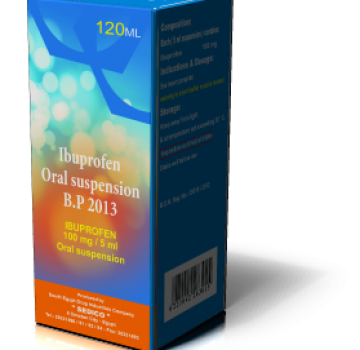Ibuprofen
Oral suspension:
-Ibuprofen should be administered orally for short term use.
Recommended for children aged 3 months to 12 years of age:
-Ibuprofen is not recommended for children under 3 months of age.
-Ibuprofen is not recommended for children weighing less than 5 kg.
For pain and fever:20mg/kg/day in divided doses.
Infants 3-6 months (weighing more than 5 kg):2.5 ml three times a day.
Do not use for more than 24 hours.
Infants 6-12 months:2.5 ml three times a day.
Children 1-2 years:2.5 ml three to four time a day.
Children 3-7 years:5 ml three to four times a day.
Children 8 -12 years:10 ml three to four times a day.
Doses should be taken every 6-8 hours when required, and at least 4 hours should be left between doses.
Post-immunization fever:2.5 m (50 mg) followed by one
further dose of 2.5ml (50 mg) six hours later if necessary.
No more than 2 doses in 24 hours. if fever is not reduced, consult a doctor.
- For children aged 3-6 months:if the child's symptoms persist for
more than 24 hours, consult a doctor.
- For children over6 months:if the child's symptoms persist for
more than 3 days, consult a doctor.
Doses should be taken every 6 - 8 hours when required, and at least 4 hours
should be left between doses.
Contraindications:
·Hypersensitivity to the active ingredient lbuprofen or any of the excipients in the product.
·Patients who have previously shown hypersensitivity reactions (e.g. Asthma, rhinitis, angioedema or urticaria) in response to aspirin or other non-steroidal anti-inflammatory drugs
·Active or history of recurrent peptic ulcer/ hemorrhage (two or more distinct episodes of proven ulceration or bleeding)
·History of increased tendency to gastrointestinal bleeding or perforation, related 10 previous NSAIDS therapy.
·Severe heart failure, renal failure or hepatic failure.
·Use during the last trimester of pregnancy.
Special
warnings and precautions for use:
Undesirable effects may be minimized by using the lowest effective dose for
the shortest duration necessary to control symptoms.
·Patients with rare hereditary problems of galactose intolerance, the lapp lactose deficiency or glucose-galactose malabsorption should not take this medication.
·The use of lbuprofen with concomitant NSAIDS, including cyclooxygenase-2selective inhibitor ,should be avoided due to the increased risk of ulceration or bleeding.
·Elderly:
The elderly have an increased frequency reverse reactions to NSAIDs especially
gastro-intestinal bleeding and perforation, which may be fatal.
As with other NSAIDs, Ibuprofen may mask the signs of infection.
Use
during pregnancy and breast-feeding:
Pregnancy:
·The use of lbuprofen should be avoided during the first 6 months of pregnancy.
·During the third trimester, lbuprofen is contra-indicated as there is a risk of premature closure of foetal ductus arteriosus with possible persistent pulmonary hypertension. The onset of labour may be delayed and the duration of labor increased with an increased bleeding tendency in both mother and neonate.
·During the first and second trimester of pregnancy, ibuprofen should not be given unless clearly necessary. If ibuprofen is used by a woman attempting to conceive. or during the first or second trimester of pregnancy, the dose should be kept as low and duration of treatment as short as possible.
·During the third trimester of pregnancy, all prostaglandin synthesis inhibitors may expose the foetus to the following: cardiopulmonary toxicity (with premature closure of the ductus arteriosus and pulmonary hypertension). Renal dysfunction which may progress to renal failure with oligohydramnios.
·At the end of pregnancy,
prostaglandin synthesis inhibitors may expose the mother and the neonate to the
following:
Possible prolongation of bleeding time. Inhibition of uterine contractions,
which may result in delayed or prolonged labour.
·Consequently, Ibuprofen Is contra-indicated during the third trimester of pregnancy.
Effect
on ability to drive and use machines:
Undesirable effects such as dizziness, drowsiness, fatigue and visual
disturbances are possible after taking NSAIDs including Ibuprofen. lf affected,
patient should not drive or operate machinery.
Adverse Effects:
Hypersensitivity reactions have been reported following treatment with
NSAIDs including Ibuprofen and these may consist of:
(a)non-specific allergic reaction and anaphylaxis
(b)respiratory tract reactivity : e.g. Asthma, aggravated asthma, bronchospasm,
dyspnoea.
(c)various skin reactions :e.g. Pruritus,urticaria, purpura, angioedema and more
rarely, exfoliate and bullous dermatoses (including stevensjohnson syndrome,
toxic epidermal necrolysis and erythema multiform.
Over dosage:
Most patients who have ingested significant amounts of ibuprofen will manifest
symptoms within 4 to 6 hours.
In children, ingestion of more than 400 mg/kg may cause symptoms.
In adults the dose response effect is less clear-cut. The half-life in overdose
is 1.5-3 hours.
Storage:
For
tablets:Keep
at temp. not exceeding 30ºC in dry place.
For oral suspension:Keep at temp. not exceeding 30ºC and keep away
from light.
Keep out of reach of children.
Produced by: sedico pharmaceutical company
Imported by: abuubakar sadiiq pharmaceutical company
